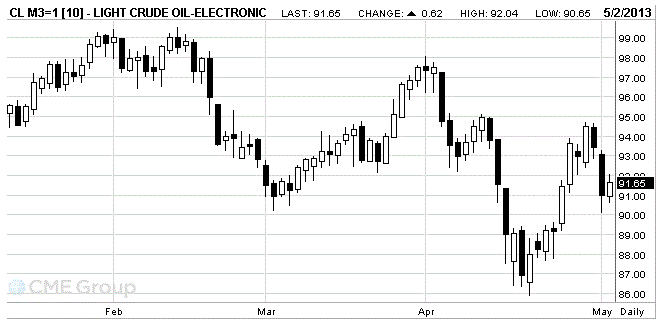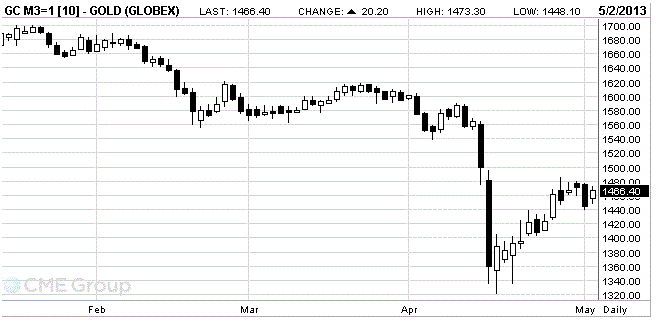Notícias do Mercado
-
16:40
Oil: an overview of the market situation
The price of oil rose, breaking the level of $ 100 a barrel as the interest rate cut by the European Central Bank has supported more risky assets, despite the shaky global outlook for oil demand and sufficient stocks.
Note that the dynamics of the trade also affected data on the number of initial claims for unemployment insurance, which fell sharply last week - to the level of 324 thousand, which indicates that the labor market is still recovering.
Meanwhile, today it was announced that the index, which measures the efficiency of production in China, fell in April, while reaffirming the fragile economic recovery. However, it is expected that the recession in the eurozone and sluggish demand in the U.S. is putting pressure on the recovery of China.
However, despite the recent developments in the oil market, a statement from the Federal Reserve that the redemption of bonds in the amount of 85 billion dollars a month to continue, providing some support. Note that many investors are also awaiting the publication of tomorrow's data on the number of U.S. non-farm payrolls for April.
We also add that the drop in oil prices below $ 100, has caused concern in some oil-exporting countries, such as Iran and Venezuela, but Europe's largest oil company Royal Dutch Shell, which has given its report today, said that it did not bother, given the that lower prices will help the economic outlook and ease the pressure on costs in the industry.
The cost of the June futures on U.S. light crude oil WTI (Light Sweet Crude Oil) rose to 91.65 dollars per barrel.
June futures price for North Sea Brent crude oil mixture rose $ 0.95 to $100.78 a barrel on the London exchange ICE Futures Europe.

-
16:20
Gold: an overview of the market situation
Gold futures rose today, as many investors had hoped that central banks should continue to pursue its policy of "easy money" that will continue to attract buyers to the precious metals.
Let us mention that the Governing Council of the ECB cut interest rates by 25 basis points up to 0.5%. In a subsequent press conference, the head of the Central Bank Mario Draghi hinted that the ECB is ready to deystvovat "if the situation requires further reduce the cost of lending. According to Draghi, the spring has kept the euro zone economy weakness, and reduced rates was aimed at maintaining recovery, which should begin later this year. The labor market situation still leaves much to be desired, and the uncertainty continues to weigh on the recovery process. Commenting on the inflation, Draghi said that its recent decline reflects the drop in energy prices, but also a consequence of large-scale temporal effects associated with changes in annual rates of prices for services in the Easter season. He suggested that during the year the inflation will be subject to volatility. The head of the Central Bank made it clear that the monetary authorities will continue to adhere to the accommodative policy as long as necessary. He also said that the ECB will consult with the other European institutions on initiatives to promote the functioning of the market in respect of asset-backed securities, debts of non-financial corporations.
We also note that today China, which is the second largest consumer of gold in the world, has resumed trading after a three-day holiday, but the demand was less than a week ago. In addition, it was learned, the demand in the physical market in Hong Kong has also been reduced.
was also easier.
The data also showed that the stocks in the SPDR Gold Trust - the largest gold exchange-traded fund in the world, fell yesterday by 0.31% to 1,075.23 tons, while leaving to the lowest level since September 2009.
The cost of the June gold futures on COMEX today rose to 1466.40 dollars an ounce.

-
06:26
Commodities. Daily history for May 1’2013:
Change % Change Last
GOLD 1,455.40 -16.70 -1.13%
OIL (WTI) 90.93 -2.53 -2.71%
-